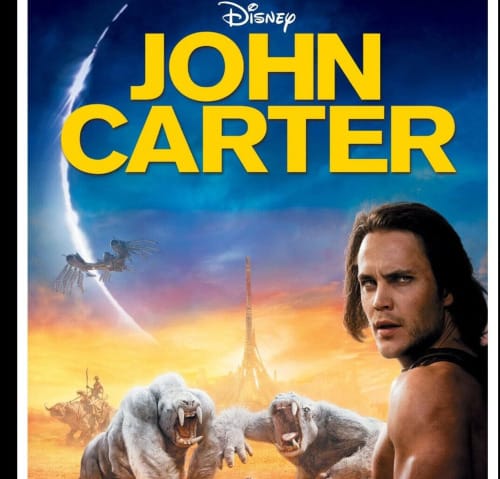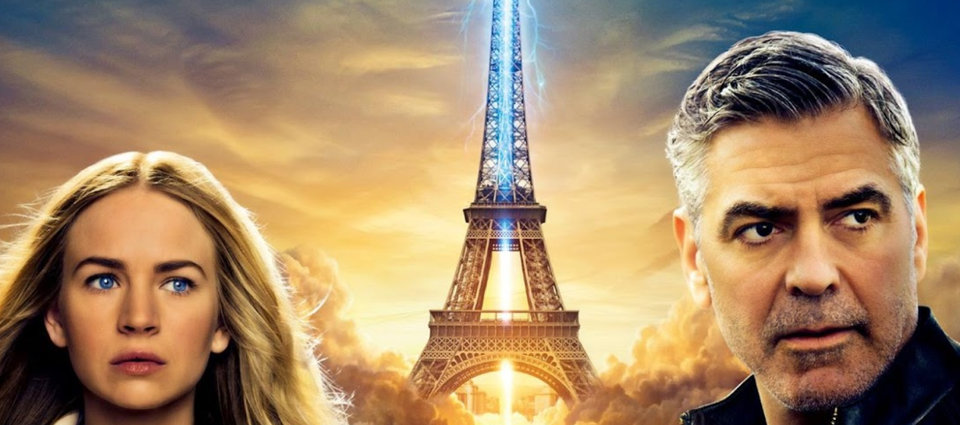John Carter
In this instalment of "what the devil were they thinking", we discover how Disney handed a $250 million dollar movie over to a neophyte live-action director and then forgot how marketing worked

Sometimes in the arts, failure seems to be baked in from the start. Some ideas never would have gotten off the ground, regardless of the best intentions of studio and talent. Other times, a host of people slave for years over a project and it gets pulled after completion. John Carter, a 2012 Disney production, fits neither of those categories. The John Carter story is one of a long, long series of bad decisions which would eventually transform Disney’s approach to film-making completely. The story of this film’s inception and failure is so infamous, there’s a book about it.
In 1911, Edgar Rice Burroughs wrote the first words of his Barsoom series, a sci-fi swords and sorcery saga set on Mars. I haven’t read any of the eleven novels myself, but they have had an outsize impact on sci-fi and fantasy in general, influencing Crichton, Clarke, Bradbury, Gygax, Heinlein, Cameron and George Lucas. Hollywood, though…Hollywood never managed to get an adaptation all the way into production. It never could make it work.
Not until Andrew Stanton persuaded Disney to pick up the rights. Stanton was riding high after the successes of his Pixar-produced Finding Nemo and Wall-E and wanted to take on the production of the series he’d loved as a boy. He pitched it, he wrote it and Disney agreed and the wheels began to turn, with Stanton signing on as director. Filming began in 2010 and the film came out in 2012 as Disney’s springtime big blockbuster.
The story starts out on Mars in the grips of civil war. A plethora of British and Irish character actors - Mark Strong, Dominic West, James Purefoy and Ciaran Hines - are squabbling over…something. The sinister Thern, Matai Shang (Strong), gifts Sab Than (West) a super weapon with which he can win the war, if Than does as Shang asks.
To the US! 1881. John Carter (Taylor Kitsch) is running from someone and sends a telegram to his nephew, Edgar Rice Burroughs, bidding him visit. When Burroughs arrives, Carter has died off screen but leaves Burroughs everything including his diary. Burroughs reads the diary.
Flashback! Arizona 1868. Carter, a former Confederate cavalry captain, is in trouble with everyone. He ends up captured by the US army, chooses to escape prison rather than sign on with the army and fight Apaches. He gets chased by the army, and then the Apaches, into a cave. Where…
Teleported to Mars by a magic medallion! Now Carter’s superpowered due to his dense bones and Mars’ lower gravity. He can jump huge distances minutes after arriving and is freakishly strong. Nonetheless, he gets captured again, this time by a six-armed green Martian, Tars Tarkas (Willem Dafoe), leader of the Tharks. Hijinks happen and Carter gets adopted by the Tharks. I’m not entirely sure why.
Plot is happening elsewhere on Mars. Than proposes an end to the Civil War by marrying the daughter of his enemy, the Princess Dejah (Lynn Collins). She is understandably upset about this, but agrees anyway.
But then off-screen she runs away! Her flying machine is pursued by Than’s, and she gets shot out of the sky, by a massive coincidence right next to Carter. But the incredible John Carter saves her by jumping miles up into the air and breaking all the known laws of physics by catching her without harming her. And Than backs off, but he doesn’t mind that much. He’s just happy to keep killing.
More hijinks! Carter, Dejah and Tarkas’s daughter, Sola, escape the Thark city and make their way to a sacred site where they discover various allegedly plot relevant things (meh). Shang returns, bringing with him a hostile alien army. Carter attempts to fight them off, but there are way too many of them. He also has a stress-related flashback in the middle of combat. I don’t know why it wasn’t introduced earlier. It seems awfully convenient. Dejah agrees to marry Than (again), but not before telling Carter how he can return to Earth.
Before Carter can leave, he is captured by Shang who explains the plot to him, something something, wheels within wheels, influence, resources, energy, something. Carter escapes (again) and decides he loves Dejah so much, he learns to pilot a flying machine in ten seconds and returns to recruit the Tharks to overthrow Than and end the war and free Dejah.
Even more hijinks! Tars Tarkas no longer leads the Tharks. Carter fights and defeats two rancors, I mean, two giant white apes before overthrowing Tarkas’s replacement and leading the Tharks on a heroic assault on the wrong city.
Nonetheless, he and later the Tharks arrive just in time to stop the wedding, defeat Than and his men and make Shang flee. Carter, after having known Dejah for maybe three days, proposes marriage to her and she accepts. That night, Carter decides to remain permanently on Mars, no doubt motivated by the prospect of effectively being king and having a hot princess to bang on the reg. But –
Hijinks! Shang reappears and sends Carter back to Earth, where he reawakens apparently years later. He spends his life trying to find the medallion to take him back to Mars and eventually pretends he’s dead to lure a Thern into the open. Carter kills the Thern, takes his medallion and goes back to Mars.
Despite the total silliness of the story, John Carter is not an entirely bad movie. Let’s begin with the good parts.
All the performances are solid. Kitsch and Collins both have this as their first major lead roles. And they both perform well. Neither the utter nonsense of the plot nor the hokeyness of the dialogue are their fault. Strong does his best with an underwritten role. West chews the scenery effectively enough. Dafoe and Morton deliver good voice performances.
The movie looks fantastic. Various desert locations on Earth are combined with beautiful CGI to develop a supremely realised setting. The action is staged and shot well. The creature designs are broadly excellent, even if the Tharks suffer from facial expressions lifted directly from Pixar’s Big Book of Animating Faces.
The problem is the story. The first twenty or so minutes are highly disorienting. The scene switches five times without any context or explanation. Civil war on Mars! Here’s John Carter! Carter’s dead! Carter in Arizona! Carter on Mars! It’s impenetrable. Worse, Stanton was warned by his collaborators that this was the case. To be fair, starting off with Carter on Mars and then stopping to explain everything probably wouldn’t work either. All of which leads to one conclusion: this isn’t a story which you can tell on screen in this manner.
It doesn’t get any better on many levels when everything’s been set up. The story is incomplete. Why does Tarkas decide to adopt Carter? Unclear. Why does Dejah instantly fall in love with Carter, and vice versa? Unclear. Why does Dejah not tell Carter how to leave in the temple? Unclear. Except it is clear. If none of those points happen, you have no story. It doesn’t help that Carter is shown to be unwilling to risk his life in another civil war. Carter has no motivation. He wants to get home. Nothing more, nothing less. His want is clear, but what’s his need? It is never explored. As a result, there are no stakes in the first 60 minutes. The characters are paper thin and it’s boring.
The second half is more engaging, but there’s nothing in the story or the movie as a whole which is new or surprising. While the Barsoom series originated a host of tropes which other creators riffed on for decades, they all did it better. Sci-fi sword play? Star Wars. Large-scale fantasy action? Lord of The Rings. Denis Villeneuve’s Dune came much later, but did much more with the desert planet setting. John Carter is a silly, superficial, old-fashioned movie made for a staggering cost with the finest of techniques and technicians.
It isn’t simply a case of the story being old-fashioned. It’s also unsophisticated and chauvinistic in a way which appealed to the readers Burroughs was writing for, but repellent to modern tastes. It is an Arthurian epic transported to Mars, where good and evil knights do battle to win the hand of a fair maiden in marriage. While Dejah is resistant to the idea of marriage for the greater good, she is extremely happy to lust after a stranger who shows no inclination to help her protect her people. Too much of the story makes no sense. Fiction is at once more sophisticated and more manipulative these days. Audiences are more genre-savvy. The state of the art has moved on, but this story has not.
All of these issues can be traced back to Andrew Stanton and the producers who greenlit his screenplay and then agreed to multiple reshoots. Stanton brought Pixar’s methods with him to live action and, as a result, the budget ballooned to over $300 million. I suspect Stanton was the wrong director. Finding Nemo and Wall-E are not the projects you want on the CV for the director of this movie. Disney needed the likes Spielberg or Cameron for a project of this ambition and risk.
Notwithstanding any of this, John Carter would be undone by marketing concerns in exactly the same way as The Lone Ranger would later be. Part of this lies at the door of Disney itself. The book John Carter and the Gods of Hollywood goes into incredible depth detailing how prior to the release of this film, Disney revamped its marketing division and this led to there being almost no coordinated marketing performed for it at all. I think it probably affected how Disney handled the marketing for The Lone Ranger too. Studios are desperate to create pre-release buzz and to get social media influencers to do much of the dirty work. Part of this is also damage and rumour control. With both John Carter and The Lone Ranger coming under repeated assault in entertainment media for being overbudget and out of control, such narratives, whether true or not, were held up as fact by critics at release. John Carter is a better movie than its terrible press and takings would have you believe. The Lone Ranger, too. Yet the media beast demands it be fed stories and what story is tastier than Disney taking another huge thrashing at the box office?
The failure of this film has had considerable fallout. Stanton may never be trusted with a tent-pole production again, but he has projects in the pipeline. The two leads, Kitsch and Collins, have not been so lucky. With the failures of this movie and Battleship, Kitsch may never again be given a big-budget lead. As for Collins, Hollywood is extremely cruel to actresses and she hasn’t had a major role since despite her not being responsible in any way for the film’s failure.
The biggest impact of all has been on Disney. After losing around $300 million on John Carter, Disney purchased Lucasfilm and got hold of the Star Wars IP. It already had Marvel. What need does Disney have to risk big money on unproven IP? It’s all Jedi and superheroes and Pixar sequels and live-action remakes of classics for the House of Mouse from here. The failure of John Carter may eventually become the death of imagination in Hollywood.



